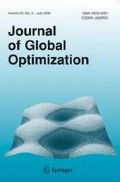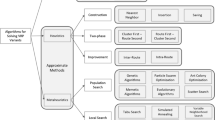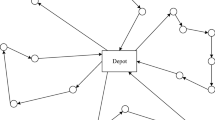Abstract
The well-known Shortest Path problem (SP) consists in finding a shortest path from a source to a destination such that the total cost is minimized. The SP models practical and theoretical problems. However, several shortest path applications rely on uncertain data. The Robust Shortest Path problem (RSP) is a generalization of SP. In the former, the cost of each arc is defined by an interval of possible values for the arc cost. The objective is to minimize the maximum relative regret of the path from the source to the destination. This problem is known as the minmax relative regret RSP and it is NP-Hard. We propose a mixed integer linear programming formulation for this problem. The CPLEX branch-and-bound algorithm based on this formulation is able to find optimal solutions for all instances with 100 nodes, and has an average gap of 17 % on the instances with up to 1,500 nodes. We also develop heuristics with emphasis on providing efficient and scalable methods for solving large instances for the minmax relative regret RSP, based on Pilot method and random-key genetic algorithms. To the best of our knowledge, this is the first work to propose a linear formulation, an exact algorithm and metaheuristics for the minmax relative regret RSP.




Similar content being viewed by others
References
Aissi, H., Bazgan, C., Vanderpooten, D.: Min-max and min-max regret versions of combinatorial optimization problems: a survey. Eur. J. Oper. Res. 197, 427–438 (2009)
Averbakh, I.: Computing and minimizing the relative regret in combinatorial optimization with interval data. Discrete Optim. 2, 273–287 (2005)
Averbakh, I., Lebedev, V.: Interval data minmax regret network optimization problems. Discrete Appl. Math. 138, 289–301 (2004)
Bean, J.C.: Genetic algorithms and random keys for sequencing and optmazion. ORSA J. Comput. 2, 154–160 (1994)
Bellman, R.: On a routing problem. Q. Appl. Math. 16, 87–90 (1958)
Ben-Tal, A., Nemirovski, A.: Robust optimization—methodology and applications. Math. Program. 92, 453–480 (2002)
Bertsekas, D.P., Tsitsiklis, J.N.: An analysis of stochastic shortest path problems. Math. Oper. Res. 16, 580–595 (1991)
Bisschop, J.: AIMMS—Optimization Modeling. Integer Linear Programming Tricks. Paragon Decision Technology B.V., Haarlem (2005)
Bondy, J.A., Murty, U.S.R.: Graph Theory with Applications. Elsevier, Amsterdam (1976)
Candia-Véjar, A., Álvarez-Miranda, E., Maculan, N.: Minmax regret combinatorial optimization problems: an algorithmic perspective. RAIRO Oper. Res. 45, 101–129 (2011)
Catanzaro, D., Labbé, M., Salazar-Neumann, M.: Reduction approaches for robust shortest path problems. Comput. Oper. Res. 38, 1610–1619 (2011)
Conde, E.: On a constant factor approximation for minmax regret problems using a symmetry point scenario. Eur. J. Oper. Res. 219, 452–457 (2012)
Desrochers, M., Laporte, G.: Improvements and extensions to the Miller–Tucker–Zemlin subtour elimination constraints. Operat. Res. Lett. 10, 27–36 (1991)
Dijkstra, E.W.: A note on two problems in connection with graphs. Numer. Math. 1, 269–271 (1959)
Duin, C., Voss, S.: The Pilot Method: A strategy for heuristic repetition with application to the Steiner problem in Graphs. Networks 34, 181–191 (1999)
Escoffier, B., Monnot, J., Spanjaard, O.: Some tractable instances of interval data minmax regret problems. Oper. Res. Lett. 36, 424–429 (2008)
Gabrel, V., Murat, C., Wu, L.: New models for the robust shortest path problem: complexity, resolution and generalization. Ann. Oper. Res. 207, 97–120 (2013)
Gallo, G., Pallottino, S.: Shorthest path methods: a unifying approach. Math. Progam. Study 26, 38–64 (1986)
Gonçalves, J.F., Resende, M.G.C.: Biased random-key genetic algorithms for combinatorial optimization. J. Heuristics 17, 487–525 (2011)
Gonçalves, J.F., de Magalhaes Mendes, J.J., Resende, M.G.C.: A genetic algorithm for the resource constrained multi-project scheduling problem. Eur. J. Oper. Res. 189, 1171–1190 (2008)
Gonçalves, J.F., Rezende, M.G.C.: Biased random-key genetic algorithms for combinatorial optmazation. J. Heuristics 17, 487–525 (2010)
Karasan, O.E., Yaman, H., Ç. Pinar, M.: The Robust Shortest Path Problem with Interval Data. Technical report, Bilkent University, Department of, Industrial Engineering (2001)
Kasperski, A., Kobylanśki, P., Kulej, M., Zieliński, P.: Minimizing Maximal Regret in Discrete Optimization Problems with Interval Data, pp. 193–208. Akademicka Oficyna Wydawnicza EXIT, Warszawa (2005)
Kasperski, A., Zieliński, P.: The robust shortest path problem in series-parallel multidigraphs with interval data. Oper. Res. Lett. 34, 69–76 (2006)
Kasperski, A., Zieliński, P.: On the existence of an FPTAS for minmax regret combinatorial optimization with interval data. Oper. Res. Lett. 35, 525–532 (2007)
Kirkpatrick, S., Gelatt, C.D., Vecchi, M.P.: Optimization by simulated annealing. Science 220, 671–680 (1983)
Kouvelis, P., Yu, G.: Robust discrete optimization and its applications. Kluver, Boston (1997)
Matsumoto, M., Nishimura, T.: Mersenne twister: a 623-dimensionally equidistributed uniform pseudo-random number generator. ACM Trans. Model. Comput. Simul. 8, 3–30 (1998)
Mendes, J.J.M., Gonçalves, J.F., Resende, M.G.C.: A random key based genetic algorithm for the resource constrained project scheduling problem. Comput. Oper. Res. 36, 92–109 (2009)
Miller, C., Tucker, A., Zemlin, R.: Integer programming formulations and traveling salesman problems. J. ACM 7, 326–329 (1960)
Montemanni, R., Gambardella, L.M.: A branch and bound algorithm for the robust spanning tree problem with interval data. Eur. J. Oper. Res. 161, 771–779 (2005)
Montemanni, R., Gambardella, L.M.: The robust shortest path problem with interval data via Benders decomposition. 40R 3, 315–328 (2005)
Montemanni, R., Gambardella, L.M., Donati, A.V.: A branch and bound algorithm for the robust shortest path problem with interval data. Oper. Res. Lett. 32, 225–232 (2004)
Nie, Y., Wu, X.: Shortest path problem considering on-time arrival probability. Transp. Res. Part B 43, 597–613 (2009)
Noronha, T.F., Rezende, M.G.C., Ribeiro, C.C.: A biased random-key genetic algorithm for routing and wavelength assignment. J. Global Optim. 50, 503–518 (2011)
Pérez, F., Astudillo, C.A., Bardeen, M., Candia-Véjar, A.: A simulated annealing approach for the minmax regret path problem. In: Proceedings of the Congresso Latino Americano de Investigación Operativa (CLAIO)—Simpósio Brasileiro de Pesquisa Operacional (SBPO) 2012. Rio de Janeiro, Brazil (2012)
Resende, M.G.C., Toso, R.F., Gonçalves, J.F., Silva, R.M.A.: A biased random-key genetic algorithm for the steiner triple covering problem. Optim. Lett. 6, 605–619 (2012)
Santos, A., Duhamel, C., Aloise, D.: Modeling the mobile oil recovery problem as a multiobjective vehicle routing problem. Model. Comput. Optim. Inf. Syst. Manag. Sci. 14, 283–292 (2008)
Spall, J.C.: Introduction to Stochastic Search and Optimization. Wiley, New York (2003)
Spears, W., DeJong, K.: On the virtues of parameterized uniform crossover. In: Belew, R., Booker, L. (eds.) Proceedings of the Fourth International Conference on Genetic Algorithms, pp. 230–236. San Mateo, Italy (1991)
Sugiyama, K., Tagawa, S., Toda, M.: Methods for visual understanding of hierarchical system structures. IEEE Trans/. Syst. Man Cybern. 2, 109–125 (1981)
Toso, R.F., Rezende, M.G.C.: A C++ application programmming interface for biased random-key algorithms (2011). http://www2.research.att.com/mgcr/doc/brkgaAPI.pdf (Online; Accessed in 20/03/2014)
Voss, S., Fink, A., Duin, C.: Looking ahead with the Pilot method. Ann. Oper. Res. 136, 285–302 (2005)
Acknowledgments
This work was partially supported by the Brazilian National Council for Scientific and Technological Development (CNPq), the Foundation for Support of Research of the State of Minas Gerais, Brazil (FAPEMIG), and Coordination for the Improvement of Higher Education Personnel, Brazil (CAPES).
Author information
Authors and Affiliations
Corresponding author
Additional information
An erratum to this article is available at http://dx.doi.org/10.1007/s10898-017-0511-3.
Rights and permissions
About this article
Cite this article
Coco, A.A., Júnior, J.C.A., Noronha, T.F. et al. An integer linear programming formulation and heuristics for the minmax relative regret robust shortest path problem. J Glob Optim 60, 265–287 (2014). https://doi.org/10.1007/s10898-014-0187-x
Received:
Accepted:
Published:
Issue Date:
DOI: https://doi.org/10.1007/s10898-014-0187-x




